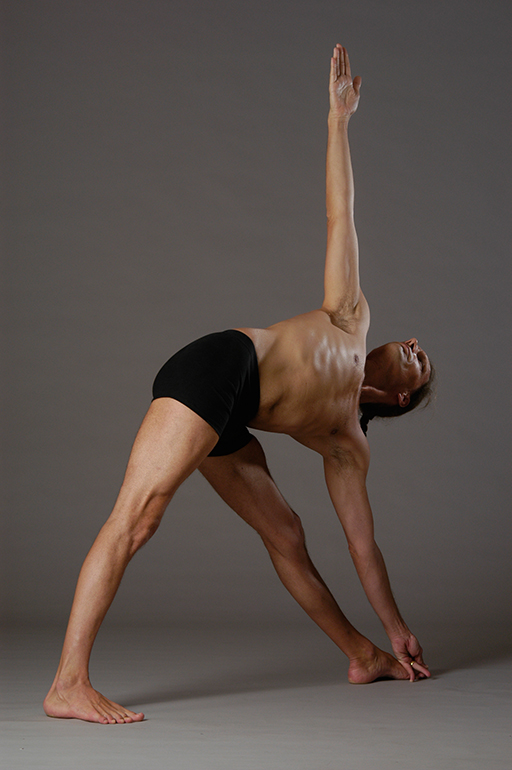Workshop
the 8-limbs as an integrated whole
7.00 bis 9.00 Uhr: Geführte Asana-Klasse und Morgenklasse im Mysore-Stil
Hier wird Gregor viele anatomische Details der meisten Haltungen der angesagten 1.Serie analysieren und dabei dennoch so zügig wie möglich unterrichten. Der Schwerpunkt liegt auf der Zerlegung der Körperhaltungen in ihre Bestandteile. Durch die sichere Ausführung der Yogastellungen und das wachsende Verständnis, welche anatomischen Bewegungen uns tief in die Asanas hineinführen, wird unnötiger Energieaufwand vermieden. Durch die Förderung von Präzision erreicht dieser Unterricht auch, dass im Körpergewebe festsitzende Konditionierungen und Emotionen gelöst werden und dich auf die höheren Ebenen des Pranayama und der Meditation vorbereitet.
Das Format im Mysore-Stil gibt dir die Möglichkeit, das Erlernte der geführten Asana-Klasse vom Vortag zu integrieren, und ermöglicht Gregor auch, individuell auf deine Bedürfnisse einzugehen.
14.30 bis 17.30 Uhr:
- Nachmittag: Jnana Yoga, Meditationen aus dem Vijnana Bhairava
- Nachmittag: das Bhakti Yoga der Bhagavad Gita
- Nachmittag: Karma Yoga, Handeln im Einklang mit dem Unendlichen: Jnana-, Bhakti- und Karma-Yoga
Jnana Yoga, Meditationen aus dem Vijnana Bhairava
In diesem Workshop werden wir Meditationen aus dem Vijnana Bhairava Tantra praktizieren, deren Ziel die Selbstverwirklichung ist. Das Vijnana Bhairava Tantra enthält eine vielseitige Mischung aus 112 Meditationstechniken. Von besonderem Interesse sind jedoch diejenigen, die sich mit der Verwirklichung der wahren Natur des Menschen als Bewusstsein befassen. Bewusstsein bedeutet in diesem Zusammenhang das, was bewusst ist, und nicht das, worüber wir uns bewusst sind (d. h. die Inhalte des Geistes). Dies führt zu großer innerer Ruhe und Stille. In der Tradition des indischen Mystikers Shri Aurobindo ist dieser Zustand jedoch nicht das Ende der spirituellen Entwicklung eines Menschen, sondern in gewisser Weise der Beginn einer intensiven Phase. Es macht uns empfänglich und offen für das Herunterladen höherer Formen spiritueller Einsichten, durch die wir in Werkzeuge des universellen Bewusstseins verwandelt werden.
Der Bhakti Yoga der Bhagavad Gita
Dieser Workshop konzentriert sich auf das Yoga der hingebungsvollen Liebe und die Nutzung der eigenen Emotionen für spirituelles Wachstum. Zu diesem Zweck werden wir darauf hinarbeiten, das Göttliche in allen Wesen sehen zu können und dem Göttlichen zu dienen, indem wir allem Leben (einschließlich nichtmenschlicher Lebensformen) dienen. Ein wichtiger Aspekt dabei ist die Überwindung des Speziesismus, also des Glaubens, dass eine Art mehr wert ist als alle anderen. Dazu müssen fehlerhafte Vorstellungen vom Göttlichen überwunden werden, wie zum Beispiel der Glaube, dass es sich um einen riesigen Menschen am Himmel handelt, was nichts anderes als eine Extrapolation unserer eigenen Vergrößerung ist. Es wird gezeigt, dass das Göttliche Intensität, Kreativität, Neuheit und Mitschöpfung aller Lebensformen fördert. Wir werden auch verstehen, dass das Göttliche kein fester Zustand, sondern ein fortlaufender Prozess ist.
Wir werden uns auch mit den psychologischen Vorteilen und Hindernissen befassen, die das Praktizieren eines Yoga der Liebe mit sich bringt. Abschließend wird ein nicht-sektiererischer Bhakti-Ansatz des 21. Jahrhunderts vorgestellt, einschließlich Praktiken, die darauf abzielen, unsere Lebensqualität, unser Glück, unsere Zufriedenheit und das Wissen zu verbessern, dass jedem von uns für das Göttliche wichtig ist. Ein wichtiger Teil davon besteht darin, zu lernen, das Göttliche in all denen zu sehen, die wir nur schwer verstehen können.
Die Hauptquelle für Bhakti ist die Bhagavad Gita, das göttliche Lied. Die Gita selbst stellt eine raffinierte Mischung aus Jnana Yoga (Yoga des Wissens), Bhakti Yoga (Yoga der Hingabe) und Karma Yoga (Yoga der Tat) dar. Wir lernen, einige der wichtigen Strophen zu singen und analysieren dann die praktischen Lektionen fürs Leben, die die Gita vermittelt.
Karma Yoga, Handeln im Einklang mit dem Unendlichen
Erinnerst du dich an eine Zeit, in der du wusstest, dass dein Leben großartig sein würde und dass du einen sinnvollen Beitrag zum Leben auf der Erde und zum Leben anderer leisten würdest? Und was ist dann passiert? Irgendwie haben uns unsere Bildung und der Prozess der Inkulturation von diesem heiligen Wissen und Elan abgeschnitten. Wir wurden zu Zynikern und „Realisten“.
Seit jeher sind menschliche Gesellschaften um die Idee herum organisiert, dass das Leben des Einzelnen und der Gesellschaft einen göttlichen Zweck hat. Dieser Workshop führt dieses Wissen auf indigene Kulturen zurück, auf die Bhagavad Gita, die Bibel und das Yoga Sutra. Unser Verlust dieses Wissens hat zu unserer Umweltzerstörung und dem sechsten Massenaussterben von Leben, sowie der aktuellen Epidemie psychischer Störungen geführt.
Dieser Workshop zeigt nicht nur, wie wir das Wissen verloren haben, dass alles Leben heilig und zielgerichtet ist, sondern er stellt auch verschiedene Techniken vor, die uns zurück zum Finden und schrittweisen Umsetzen des göttlichen Lebenszwecks (Svadharma) führen und dass die Umsetzung darin besteht, in Übereinstimmung mit ihm zu handeln das Unendliche (Karma Yoga).
Ebenfalls abgedeckt sind:
- Die Praxis und Psychologie des Yoga des Handelns
- Hindernisse überwinden
- Woher wissen wir, dass es die richtige Stimme ist?
- Tägliches Reinigungsprogramm des Unterbewusstseins
- Im Kern im Zentrum sein und den inneren Dialog beruhigen
- Bedeutung von Vergebung, Dankbarkeit, Akzeptanz und Hingabe
English:
7.00 bis 9.00h: Guided and Mysore-style asana classes
Here Gregor will analyse the many intricate anatomical details of the majority of the postures of the Primary Series, while maintaining as much pace as possible. The focus will be on breaking down the various phases of entering and exiting the postures into their constituents. Performing postures safely while understanding which anatomical actions will get us deep into the asanas will prevent unnecessary energy expenditure. Through inducing precision this format also achieves that conditioning and emotions lodged in bodily tissue are released, preparing us for the higher limbs of pranayama and meditation.
The Mysore-style format will give students the opportunity to integrate the information learning in the Led class and also for Gregor to give individual attention to student’s needs.
Evening 1: Jnana Yoga, meditations from the Vijnana Bhairava
Jnana, Bhakti and Karma Yogas
Jnana Yoga, meditations from the Vijnana Bhairava
In this workshop we will practice meditations from the Vijnana Bhairava Tantra that have self-realization as their goal. The Vijnana Bhairava Tantra contains an eclectic mix of 112 meditation techniques but of particular interest are those that deal with realizing ones true nature as consciousness. Consciousness in this context means that what is conscious rather than that what we are conscious of (i.e. the contents of the mind). This leads to great inner peace and stillness. In the tradition of the Indian mystic Shri Aurobindo this state, however, is not the end of one’s spiritual evolution but in some ways the beginning of it intense phase. It makes us receptive and open to download higher forms of spiritual insight through which we become transformed into tools of universal consciousness.
The Bhakti Yoga of the Bhagavad Gita
This workshop focusses on the yoga of devotional love and the harnessing of ones emotions for spiritual growth. For this purposes we will work towards being able to see the Divine in all beings and to serve the Divine through serving all life (including non-human life forms). An important aspect of this is to overcome speciesism, the belief that one species is worth more than all others. For this it is to overcome faulty concepts of the Divine, such as the belief that It is a giant human in the sky, which is nothing but an extrapolation of our own aggrandisement. The Divine will be shown to promote intensity, creativity, novelty and co-creation with all life forms. We will also come to understand that the Divine is not a solid state but an ongoing process.
We will also look at the psychological advantages and obstacles to practising a yoga of love. Finally a non-sectarian, 21st century approach to bhakti will be presented, including practices designed to improve our quality of life, happiness, contentment and the knowledge that each of us matters to the Divine. An important part of that is to learn to see the Divine in all those we struggle to understand.
The main source for Bhakti is the Bhagavad Gita, the Divine Song. The Gita itself presents a sophisticated mix of Jnana Yoga (yoga of knowledge), Bhakti Yoga (yoga of devotion) and Karma Yoga (yoga of action). We will learn to chant some of the important stanzas and then analyse the practical lessons for life that the Gita imparts.
Karma Yoga, action in alignment with the Infinite
Do you remember a time when you knew that your life would be amazing and that you would live to make a meaningful contribution to life on Earth and the life of others? And then what happened? Somehow our education and the process of enculturation cut us off from this sacred knowledge and élan vital. We became cynics and “realists”.
Since time immemorial human societies were organized around the idea that the life of the individual and of society have divine purpose. This workshop traces this knowledge to indigenous cultures, to the Bhagavad Gita, the Bible and the Yoga Sutra. Our loss of this knowledge is what has led to our environmental destruction and the 6th mass extinction of life as well as the current epidemic of mental disorders.
This workshop not only shows how we lost the knowledge that all life is sacred and purposeful, it also introduces layers of technique to lead us back to finding and gradually implementing our life’s divine purpose (svadharma) and that implementing it is to act in alignment with the Infinite (Karma Yoga).
Also covered are:
- The practice & psychology of the yoga of action
- Overcoming obstacles
- How do we know it’s the right voice?
- Daily cleansing regime of the subconscious mind
- Being in the zone and absence of internal dialogue
- Importance of forgiveness, gratitude, acceptance and surrender
7.00 bis 9.00 Uhr: Geführte Asana-Klasse und Morgenklasse im Mysore-Stil
Hier wird Gregor viele anatomische Details der meisten Haltungen der angesagten 1.Serie analysieren und dabei dennoch so zügig wie möglich unterrichten. Der Schwerpunkt liegt auf der Zerlegung der Körperhaltungen in ihre Bestandteile. Durch die sichere Ausführung der Yogastellungen und das wachsende Verständnis, welche anatomischen Bewegungen uns tief in die Asanas hineinführen, wird unnötiger Energieaufwand vermieden. Durch die Förderung von Präzision erreicht dieser Unterricht auch, dass im Körpergewebe festsitzende Konditionierungen und Emotionen gelöst werden und dich auf die höheren Ebenen des Pranayama und der Meditation vorbereitet.
Das Format im Mysore-Stil gibt dir die Möglichkeit, das Erlernte der geführten Asana-Klasse vom Vortag zu integrieren, und ermöglicht Gregor auch, individuell auf deine Bedürfnisse einzugehen.
14.30 bis 17.30 Uhr:
- Nachmittag: Jnana Yoga, Meditationen aus dem Vijnana Bhairava
- Nachmittag: das Bhakti Yoga der Bhagavad Gita
- Nachmittag: Karma Yoga, Handeln im Einklang mit dem Unendlichen: Jnana-, Bhakti- und Karma-Yoga
Jnana Yoga, Meditationen aus dem Vijnana Bhairava
In diesem Workshop werden wir Meditationen aus dem Vijnana Bhairava Tantra praktizieren, deren Ziel die Selbstverwirklichung ist. Das Vijnana Bhairava Tantra enthält eine vielseitige Mischung aus 112 Meditationstechniken. Von besonderem Interesse sind jedoch diejenigen, die sich mit der Verwirklichung der wahren Natur des Menschen als Bewusstsein befassen. Bewusstsein bedeutet in diesem Zusammenhang das, was bewusst ist, und nicht das, worüber wir uns bewusst sind (d. h. die Inhalte des Geistes). Dies führt zu großer innerer Ruhe und Stille. In der Tradition des indischen Mystikers Shri Aurobindo ist dieser Zustand jedoch nicht das Ende der spirituellen Entwicklung eines Menschen, sondern in gewisser Weise der Beginn einer intensiven Phase. Es macht uns empfänglich und offen für das Herunterladen höherer Formen spiritueller Einsichten, durch die wir in Werkzeuge des universellen Bewusstseins verwandelt werden.
Der Bhakti Yoga der Bhagavad Gita
Dieser Workshop konzentriert sich auf das Yoga der hingebungsvollen Liebe und die Nutzung der eigenen Emotionen für spirituelles Wachstum. Zu diesem Zweck werden wir darauf hinarbeiten, das Göttliche in allen Wesen sehen zu können und dem Göttlichen zu dienen, indem wir allem Leben (einschließlich nichtmenschlicher Lebensformen) dienen. Ein wichtiger Aspekt dabei ist die Überwindung des Speziesismus, also des Glaubens, dass eine Art mehr wert ist als alle anderen. Dazu müssen fehlerhafte Vorstellungen vom Göttlichen überwunden werden, wie zum Beispiel der Glaube, dass es sich um einen riesigen Menschen am Himmel handelt, was nichts anderes als eine Extrapolation unserer eigenen Vergrößerung ist. Es wird gezeigt, dass das Göttliche Intensität, Kreativität, Neuheit und Mitschöpfung aller Lebensformen fördert. Wir werden auch verstehen, dass das Göttliche kein fester Zustand, sondern ein fortlaufender Prozess ist.
Wir werden uns auch mit den psychologischen Vorteilen und Hindernissen befassen, die das Praktizieren eines Yoga der Liebe mit sich bringt. Abschließend wird ein nicht-sektiererischer Bhakti-Ansatz des 21. Jahrhunderts vorgestellt, einschließlich Praktiken, die darauf abzielen, unsere Lebensqualität, unser Glück, unsere Zufriedenheit und das Wissen zu verbessern, dass jedem von uns für das Göttliche wichtig ist. Ein wichtiger Teil davon besteht darin, zu lernen, das Göttliche in all denen zu sehen, die wir nur schwer verstehen können.
Die Hauptquelle für Bhakti ist die Bhagavad Gita, das göttliche Lied. Die Gita selbst stellt eine raffinierte Mischung aus Jnana Yoga (Yoga des Wissens), Bhakti Yoga (Yoga der Hingabe) und Karma Yoga (Yoga der Tat) dar. Wir lernen, einige der wichtigen Strophen zu singen und analysieren dann die praktischen Lektionen fürs Leben, die die Gita vermittelt.
Karma Yoga, Handeln im Einklang mit dem Unendlichen
Erinnerst du dich an eine Zeit, in der du wusstest, dass dein Leben großartig sein würde und dass du einen sinnvollen Beitrag zum Leben auf der Erde und zum Leben anderer leisten würdest? Und was ist dann passiert? Irgendwie haben uns unsere Bildung und der Prozess der Inkulturation von diesem heiligen Wissen und Elan abgeschnitten. Wir wurden zu Zynikern und „Realisten“.
Seit jeher sind menschliche Gesellschaften um die Idee herum organisiert, dass das Leben des Einzelnen und der Gesellschaft einen göttlichen Zweck hat. Dieser Workshop führt dieses Wissen auf indigene Kulturen zurück, auf die Bhagavad Gita, die Bibel und das Yoga Sutra. Unser Verlust dieses Wissens hat zu unserer Umweltzerstörung und dem sechsten Massenaussterben von Leben, sowie der aktuellen Epidemie psychischer Störungen geführt.
Dieser Workshop zeigt nicht nur, wie wir das Wissen verloren haben, dass alles Leben heilig und zielgerichtet ist, sondern er stellt auch verschiedene Techniken vor, die uns zurück zum Finden und schrittweisen Umsetzen des göttlichen Lebenszwecks (Svadharma) führen und dass die Umsetzung darin besteht, in Übereinstimmung mit ihm zu handeln das Unendliche (Karma Yoga).
Ebenfalls abgedeckt sind:
- Die Praxis und Psychologie des Yoga des Handelns
- Hindernisse überwinden
- Woher wissen wir, dass es die richtige Stimme ist?
- Tägliches Reinigungsprogramm des Unterbewusstseins
- Im Kern im Zentrum sein und den inneren Dialog beruhigen
- Bedeutung von Vergebung, Dankbarkeit, Akzeptanz und Hingabe
English:
7.00 bis 9.00h: Guided and Mysore-style asana classes
Here Gregor will analyse the many intricate anatomical details of the majority of the postures of the Primary Series, while maintaining as much pace as possible. The focus will be on breaking down the various phases of entering and exiting the postures into their constituents. Performing postures safely while understanding which anatomical actions will get us deep into the asanas will prevent unnecessary energy expenditure. Through inducing precision this format also achieves that conditioning and emotions lodged in bodily tissue are released, preparing us for the higher limbs of pranayama and meditation.
The Mysore-style format will give students the opportunity to integrate the information learning in the Led class and also for Gregor to give individual attention to student’s needs.
Evening 1: Jnana Yoga, meditations from the Vijnana Bhairava
Jnana, Bhakti and Karma Yogas
Jnana Yoga, meditations from the Vijnana Bhairava
In this workshop we will practice meditations from the Vijnana Bhairava Tantra that have self-realization as their goal. The Vijnana Bhairava Tantra contains an eclectic mix of 112 meditation techniques but of particular interest are those that deal with realizing ones true nature as consciousness. Consciousness in this context means that what is conscious rather than that what we are conscious of (i.e. the contents of the mind). This leads to great inner peace and stillness. In the tradition of the Indian mystic Shri Aurobindo this state, however, is not the end of one’s spiritual evolution but in some ways the beginning of it intense phase. It makes us receptive and open to download higher forms of spiritual insight through which we become transformed into tools of universal consciousness.
The Bhakti Yoga of the Bhagavad Gita
This workshop focusses on the yoga of devotional love and the harnessing of ones emotions for spiritual growth. For this purposes we will work towards being able to see the Divine in all beings and to serve the Divine through serving all life (including non-human life forms). An important aspect of this is to overcome speciesism, the belief that one species is worth more than all others. For this it is to overcome faulty concepts of the Divine, such as the belief that It is a giant human in the sky, which is nothing but an extrapolation of our own aggrandisement. The Divine will be shown to promote intensity, creativity, novelty and co-creation with all life forms. We will also come to understand that the Divine is not a solid state but an ongoing process.
We will also look at the psychological advantages and obstacles to practising a yoga of love. Finally a non-sectarian, 21st century approach to bhakti will be presented, including practices designed to improve our quality of life, happiness, contentment and the knowledge that each of us matters to the Divine. An important part of that is to learn to see the Divine in all those we struggle to understand.
The main source for Bhakti is the Bhagavad Gita, the Divine Song. The Gita itself presents a sophisticated mix of Jnana Yoga (yoga of knowledge), Bhakti Yoga (yoga of devotion) and Karma Yoga (yoga of action). We will learn to chant some of the important stanzas and then analyse the practical lessons for life that the Gita imparts.
Karma Yoga, action in alignment with the Infinite
Do you remember a time when you knew that your life would be amazing and that you would live to make a meaningful contribution to life on Earth and the life of others? And then what happened? Somehow our education and the process of enculturation cut us off from this sacred knowledge and élan vital. We became cynics and “realists”.
Since time immemorial human societies were organized around the idea that the life of the individual and of society have divine purpose. This workshop traces this knowledge to indigenous cultures, to the Bhagavad Gita, the Bible and the Yoga Sutra. Our loss of this knowledge is what has led to our environmental destruction and the 6th mass extinction of life as well as the current epidemic of mental disorders.
This workshop not only shows how we lost the knowledge that all life is sacred and purposeful, it also introduces layers of technique to lead us back to finding and gradually implementing our life’s divine purpose (svadharma) and that implementing it is to act in alignment with the Infinite (Karma Yoga).
Also covered are:
- The practice & psychology of the yoga of action
- Overcoming obstacles
- How do we know it’s the right voice?
- Daily cleansing regime of the subconscious mind
- Being in the zone and absence of internal dialogue
- Importance of forgiveness, gratitude, acceptance and surrender
Du kennst die erste Serie bis zu den ersten Sitzpositionen und fühlst dich darin sicher.
Preis: 290€
Durch Bezahlung des Beitrags über unseren Shop kaufst du den Workshop.
Danach buchst du deinen Platz, indem du in unserem Kursplan auf den Termin im September gehst und dort den Platz buchst.
Damit ist dein Platz reserviert.
Das Programm ist so eingestellt, dass du nur den Dienstag buchst und automatisch alle anderen Tage mit gebucht hast.
DETAILS
Kenntnisse: Basis 2 – Fortgeschrittene
Lehrer: Gregor Maehle
Teilnehmer (min/max): 10-30
Anmeldefrist: bis 05.09.2023
Anmeldung: durch Kauf im Online-Shop



